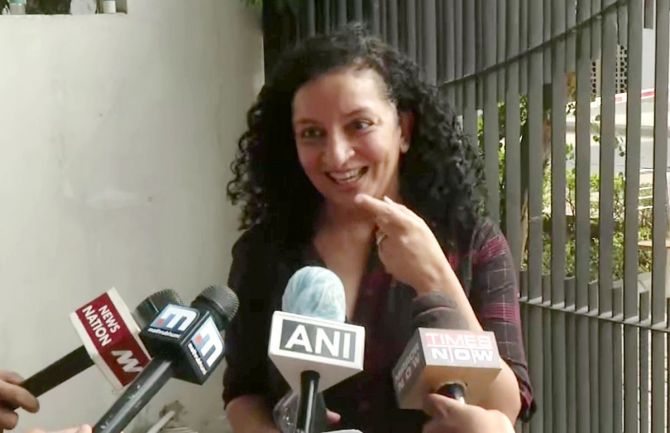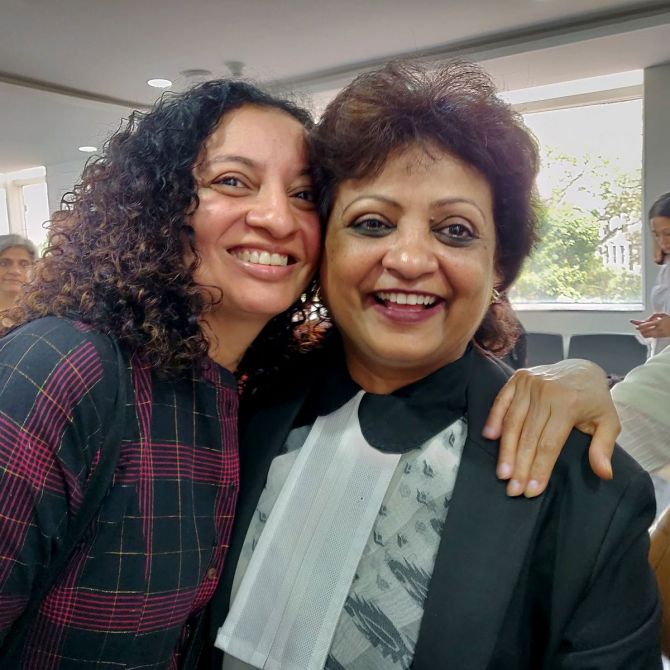 | « Back to article | Print this article |
'There are tremendous personal, economic and emotional costs to bear in a case.'
'And those costs were suffered by Priya and Priya alone.'
'Nobody goes happily to court and you wouldn't wish that on anyone.'

On February 17, a Delhi court acquitted Priya Ramani in the criminal defamation case initiated by former Union minister and ex-editor M J Akbar in relation to sexual harassment allegations levelled against him during the #MeToo movement of 2018.
The landmark judgment, which could make workplaces safer for women in India and encourage them to speak up against harassment, was a result of a tough fight put up by Ramani and her lawyer, Senior Advocate Rebecca John.
"This (verdict) is as much for you as it was for Priya Ramani. This is something that resonates in all our lives," John says to all working women who cheered on from the sidelines of the case.
In this interview to Rediff.com Senior Contributor Nishi Tiwari, John revisits the case, reveals why it was one of the most challenging trials of her career and the collective determination of the women who made the win possible.
What does this victory mean to you, for the women in the workplace and for the #MeToo movement in India?
In the life of a lawyer, we do all manner of cases. Some cases are with larger messages, while others aren't.
Some cases are relevant to substantial section of communities outside and some cases are personal and relevant to the person fighting it.
But once in a while, a lawyer gets to do a matter that she truly believes in and this is one such case.
I really felt privileged to be a part of this journey.
I looked at the stories of amazing women, I saw them testify in court in very adverse conditions.
I saw them stick to their truth and not waver in their commitment to the cause.
So even as a lawyer, it was an experience of a lifetime for me.
I just count myself to be very fortunate to have witnessed that journey.
As for the #MeToo movement, looking at it from my point of view, I can only say that this was a case that Priya Ramani was defending, not prosecuting.
She had spoken out during the India #MeToo movement.
She was chosen for this prosecution -- I don't know why -- and therefore we maintained in court, that by selectively targeting her, it was meant to create a chilling effect on women so that they would not speak out.
I hope that self-imposed embargo lifts because we have seen the court acquit Priya, we've seen the court say that it believed in Priya's testimony and her account of what happened in 1993.
We've also seen the court go as far as saying that sexual harassment in the workplace is something that can never be tolerated.
So, I think the self-imposed embargo as a consequence of a highly selective trial, which had a rippling, chilling effect on other women, may be lifted due to this decision and it may empower more and more women to challenge the wrongs in their workplace.
You said that in such cases, women have to stand their ground in court under very adverse conditions. Could you elaborate on that?
Any journey into court is not pleasant. Nobody would want to subject themselves to that.
There are tremendous personal, economic and emotional costs to bear in a case.
And those costs were suffered by Priya and Priya alone.
Nobody goes happily to court and you wouldn't wish that on anyone.
It wasn't a joyride for her.
It meant coming to Delhi multiple times, it meant being on the spotlight, it meant taking on the pressure of court hearings, going onto the witness stand and subjecting herself to cross-examination... It wasn't easy.
That's what I mean by adverse conditions.
It was extremely challenging for her, but she didn't relent and we didn't relent.
Going into the case, what were your initial thoughts?
Well, I was asked by Priya whether I could represent her and I said I definitely would.
It meant that I would have to dedicate myself to this case and for me as a practitioner (now more or less permanently in the high court and some times in the Supreme Court) it meant going back to the trial court.
But I am very familiar with trial court practice; that's the bread-and-butter practice I have grown up on so it is not a challenge I find intimidating at all.
I think I was pretty much there for every hearing.
I didn't not abandon the space for even a single day of the hearing.
You've said that it was an extremely difficult trial to do. What were some of the biggest challenges you faced?
Sometimes, when incidents that take pace in people's lives which are 20 years old, other than their own word for it, what else can you offer as proof? In any case, when something happens in the privacy of a room, how do you prove that incident?
There were challenges.
As it is, the atmosphere in court of the Indian criminal justice system is adversarial in nature and this was particularly adversarial.
There was a lot of tension because of the personalities involved, most of which was witnessed by a lot of girls who were following this case.
It might look like a simple case defamation, but we pleaded exceptions.
It was an ethical battle, but I fought it legally and it required to be fought with a very keen eye on the law.
Therefore, I combined my experience as a lawyer with Priya's own experience of what happened to put forward a case which was legally sustainable.
That's why I said it was very challenging.
But to me it was also challenging because of the incredibly hostile atmosphere that was created inside.

Would you say that this kind of hostility is a common occurrence during such trials?
I have appeared in far more serious criminal cases where people could potentially be sentenced to life or death, but we proceed with our work.
There is, of course, the burden of carrying a serious case on your shoulders but... (pauses) this was something else, let me just put it like that.
What was Priya Ramani's frame of mind during the trial?
I think she placed her trust in her legal team.
She was confident that she would withstand any pressure or anything that was thrown at her.
She went with the flow. I never saw her grumbling or being difficult.
She was an extremely dilligent client. She would completely understand instructions... these are the things we expect from clients and in that sense, it was a very solid partnership that we, as a team and she as well as some of her close associates who were a part of the journey, went through.
How would you describe the role of the witnesses who testified in the case, especially Ghazala Wahab?
I think it is incredible.
This is why I said this case was so special, so difficult and such a privilege for me to be a part of.
For someone to put herself out there and testify in a case in which she was not being prosecuted, but come out and give out evidence which could go a long way in judging the fate of the trial and repeating an intensely personal and painful experience...
The courage displayed by Ghazala, by the exceptional solidarity to the court that she showed and by her simple commitment to justice, it's remarkable.
In the end, what do you think worked in your favour?
The fact that the court accepted Priya's version of events completely.
Here was a woman who spoke the truth, held on to the truth, came and testified with respect to that truth and subjected herself to cross examination...
As a female lawyer, what were some of the high points of the case for you?
I don't look at myself as a female lawyer.
I am a criminal lawyer with a wealth of experience on the criminal side.
This was about women and therefore a lot of the issues raised resonated with me as a woman.
There are very few women who haven't faced harassment of some kind or the other at some stage of their lives.
In that sense, even for a lawyer, this becomes personal.
It is a journey where you want to do something extra. I am glad we succeeded.
Feature Presentation: Aslam Hunani/Rediff.com